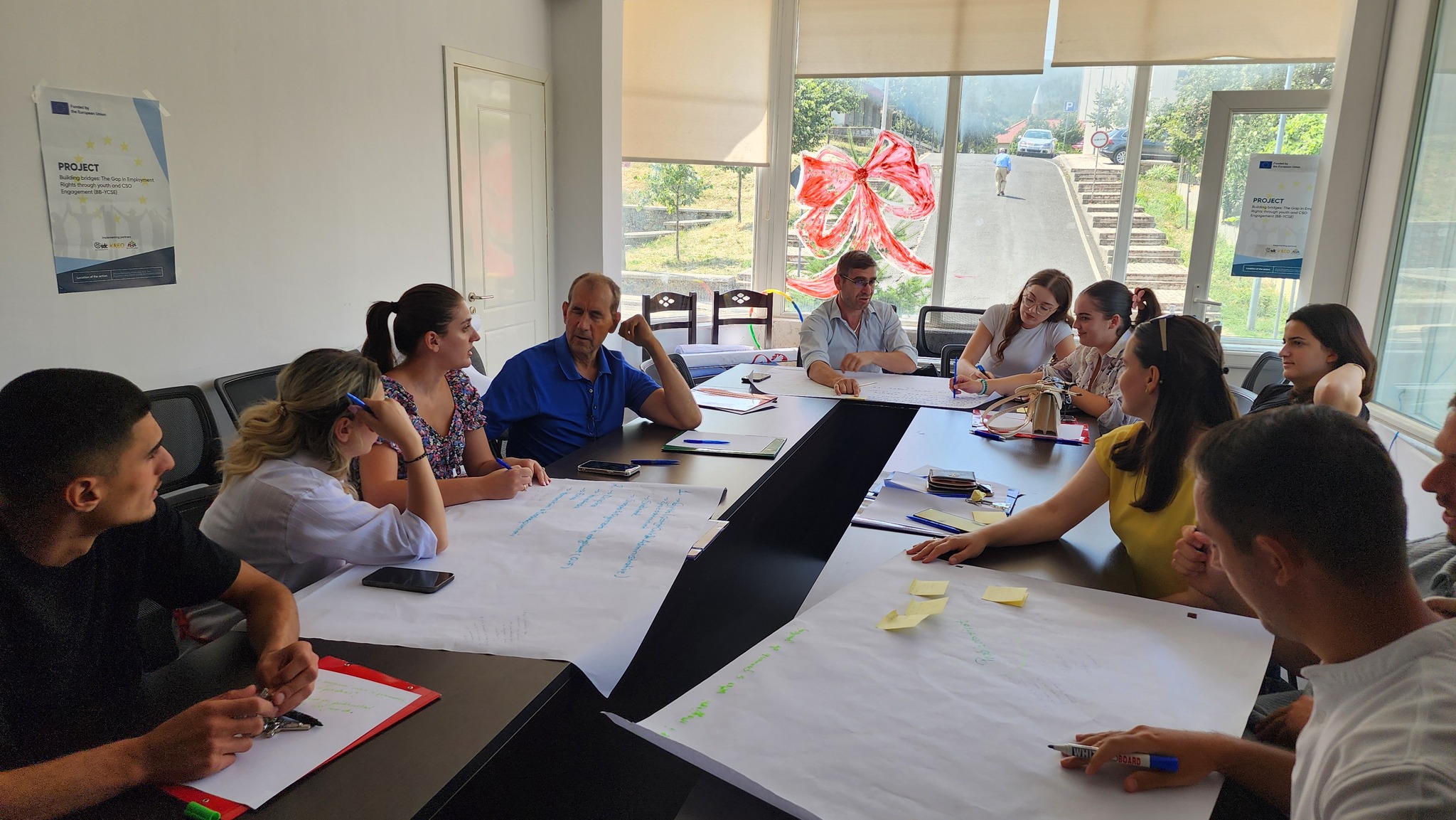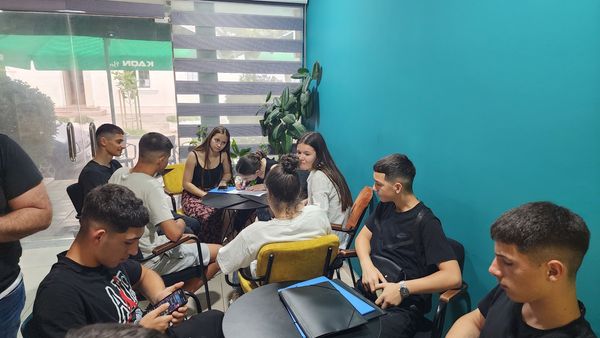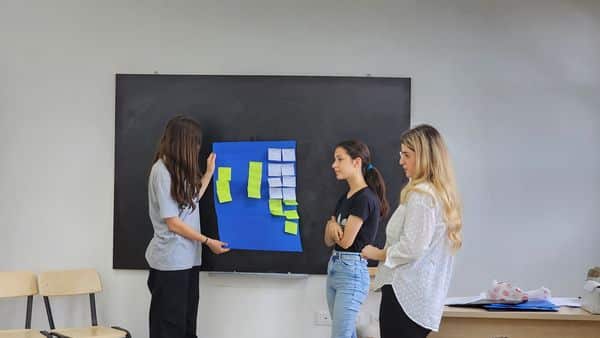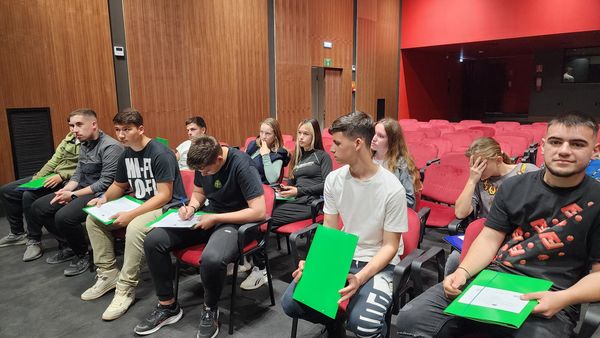Building Bridges: Bridging the Gap in Employment Rights through Youth and CSO Engagement (BB-YCSE) is a project funded by the European Union.
The aim of this project is to improve the capacities of young people (male and female) including the groups at the risk of exclusion and CSOs at local level on promotion and protection of social and employment rights in line with international standards.
After 2016, civic activism and advocacy for human rights in Albania experienced a positive trend, where CSOs addressed a wide range of fields, including women’s and children’s rights, high education reform, rule of law, good governance, the environment, etc. However according to reports by international organizations, CSOs provide a narrowed range of basic social services despite positive trends in CSO involvement, the lack of thematic approach on democracy and human rights, as well as the non-compliance of local and central governments with necessary recommendations (mainly legal context) has reduced the trust of citizens in local and central government institutions. Since 2020, there have been positive examples of CSO involvement in continuous efforts to promote human rights, including monitoring and watchdog activities. However, most of initiatives so far haven’t been supported by the level of collaboration instances with local government units and community representatives, including youth/marginalized groups.
Albania has signed dozens of conventions and treaties addressing fundamental human rights and freedoms, non-discrimination and labour rights. For the most part, international instruments and conventions have been transposed into Albanian legislations. Throughout its membership in the ILO, Albania has ratified 54 conventions, including the convention regarding discrimination in respect of Employment and Occupation. Albania is responsible for reporting on the advancement of labour rights and labour conditions to international mechanisms, established by relevant international acts ratified by the Albanian Parliament or adhered to by Albania. Albania has ratified all ILO labour conventions, including:
ILO Convention No 87 on Freedom of Association and Protection of the Right to organise Convention, included in the Labour Code.
ILO Convention No 100 on Equal Remuneration
ILO Convention No 111 on Discrimination (Employment and Occupation).
ILO Convention No .138 on the Minimum Age
Convention No 182 on the Worst forms of Child Labour
ILO Convention No 29, the Forced Labour Convention
Convention No. 105 on the Abolition of Forced Labour.
Regarding the EU Directives, 16 of them have been fully or partially harmonised in the Albanian Labour Code. While Albania has performed well in transposing directives to its national legislation, implementation remains weak.
Although the law on employment in Albania prohibits discrimination based on race, religion, colour, sex (including pregnancy), ethnic, disability, sexual orientation or gender identity, HIV or AIDS status, or refugee or stateless status, still the government did not consistently enforce the law. Many persons in the private sector worked six days a week. The law requires rest periods and premium pay for overtime, but employers did not always observe these provisions. The government rarely enforced laws related to maximum daily and weekly working hours, limits on overtime, or premium pay for overtime, especially in the private sector. These laws did not apply to workers in the informal sector. Workers in the informal sector made up 57 percent of the economy according to the I L O’s 2019. Informal workers are not covered by wage, hour and occupational safety and health laws and the government did not provide social protections for informal workers. Penalties were rarely applied against violators. Workers often could not remove themselves from situation that endangered their health or safety without jeopardizing their employment.
The reasons above as well as the lack of the knowledge and awareness to young people, jobseekers and those employed brings the necessity of the capacitated youth and CSOs to promote and monitor/observe the enforcements of social labour rights.
According to the European Social Charter (report February 2022) labour rights comprise: right to just conditions of work, right to fair remuneration; right to organize; right to bargain collectively, right of workers to be informed and consulted, right of workers to take part in determination and improvement of working conditions and environment, right to dignity of work, right of workers representatives to protection in the undertaking and facilities to be accorded to them and right to information and consultation in collective redundancy procedures.
The key target group of the action are young people (male and female, incl marginalized groups), job seekers and employed, human rights’ local CSOs, including youth CSOs, local authorities, Community Based Organizations in urban and rural areas in 10 municipalities.
The Action will be implemented in 10 municipalities selected based on the criteria of low level of developed capacities of youth and CSOs in promoting and monitoring the labour human rights, high rates of informal employment and no information/data/assessment on knowledge and capacities as well as no management of cases of violations of the law enforcements.
Overall Objective is to Improve Youth, CSOs, and local authorities’ capacities to integrate Programs/approaches and activities in social labour rights in their agenda and strengthen governmental and civil society efforts related to inclusion of vulnerable youth to promoting human rights on employment
Expected Results
- Increased knowledge and information on situation of young people and capacities of CSOs with regard to the main challenges on human rights particularly the social labour rights;
- Increased awareness of CSOs, local youth organizations, government and private business in 10 municipalities on social labour rights.
- Enable environment for CSOs and Young people (male and female) especially in rural areas and from poor marginalized/disadvantages communities to benefit from direct actions in support of promoting and monitoring social labour rights.






